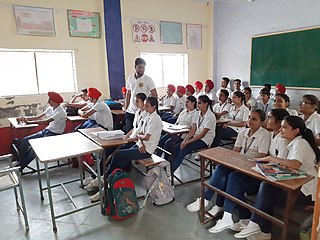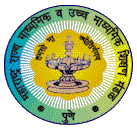
Vocational education is education that prepares people for a skilled craft. Vocational education can also be seen as that type of education given to an individual to prepare that individual to be gainfully employed or self employed with requisite skill. Vocational education is known by a variety of names, depending on the country concerned, including career and technical education, or acronyms such as TVET and TAFE. TVE refers to all forms and levels of education which provide knowledge and skills related to occupations in various sectors of economic and social life through formal, non-formal and informal learning methods in both school-based and work-based learning contexts. To achieve its aims and purposes, TVE focuses on the learning and mastery of specialized techniques and the scientific principles underlying those techniques, as well as general knowledge, skills and values.

Education in India is primarily managed by the state-run public education system, which falls under the command of the government at three levels: central, state and local. Under various articles of the Indian Constitution and the Right of Children to Free and Compulsory Education Act, 2009, free and compulsory education is provided as a fundamental right to children aged 6 to 14. The approximate ratio of the total number of public schools to private schools in India is 10:3.

The International Association of Universities (IAU) is a membership-led non-governmental organization working in the field of global higher education. It has more than 600 members in over 130 countries, including institutions, organizations, affiliates, and associates in higher education. The IAU was created under and is an official associate partner of the United Nations Educational Scientific and Cultural Organization (UNESCO).

The Maharashtra State Board of Secondary and Higher Secondary Education is a statutory and autonomous body established under the "Maharashtra Secondary Boards Act" 1965. Most important task of the board, among few others, is to conduct the SSC for 10th class and HSC for 12th class examinations. It is the most popular education board in terms of enrollment in high school in India only after the Central Board of Secondary Education.
The Western Australian Certificate of Education (WACE) is the credential awarded to students who have completed senior secondary education in the state of Western Australia. It is the Western Australian graduation certificate of the Australian Senior Secondary Certificate of Education. Students are required to meet various breadth and depth requirements, achievement standards and literacy and numeracy standards across their final years of schooling. As of the 2020 WACE, there are 106 courses available for students to study. Many WACE students are awarded an Australian Tertiary Admission Rank (ATAR), summarising their results across all areas of study into one ranking for the purposes of university admission. Students may choose from ATAR courses, which count directly towards their ATAR, Vocational Education and Training courses, which are more practical courses and can lead to further vocational opportunities, and, from 2021, General courses, which provide pathways to university, employment, or further vocational education and training. From 2010, the WACE replaced the Tertiary Entrance Exam (TEE), as the standard academic examination for school leavers in Western Australia.

Association of Indian Universities (AIU) is an organisation and association of universities in India including central, state, institutes of National Importance and Deemed Universities. It is based in Delhi. It evaluates the courses, syllabi, standards, and credits of foreign Universities pursued abroad and equates them in relation to various courses offered by Indian universities.

National Council of Educational Research and Training (NCERT) is an autonomous organisation of Ministry of Education, the Government of India. Established in 1961, it is a literary, scientific and charitable Society under the Societies Registration Act. Its headquarters are located at Sri Aurbindo Marg in New Delhi. Dr. Dinesh Prasad Saklani is the director of NCERT since 2022.

Education in Nigeria is overseen by the Federal Ministry of Education. The local authorities take responsibility for implementing state-controlled policy regarding public education and state schools. The education system is divided into Kindergarten, Primary education, Secondary education, and Tertiary education. Nigeria's federal government has been dominated by instability since declaring independence from Britain, and as a result, a unified set of education policies is yet to be successfully implemented. Regional differences in quality, curriculum, and funding characterize the education system in Nigeria. Currently, Nigeria possesses the largest population of out-of-school learning youths in the world. The educational systems in Nigeria are divided into two the public where the student only pays for Parents Teachers Association (PTA) while the private where students pay school fees and some other fees like sports, exam fees, computer fees etc. and they are costly

Indira Gandhi National Open University, known as IGNOU, is a public distance learning university located in New Delhi, India. Named after the former Prime Minister of India Indira Gandhi, the university was established in 1985 with a budget of ₹20 million, after the Parliament of India passed the Indira Gandhi National Open University Act, 1985. IGNOU is run by the central government of India, and with a total active enrollment of over 4 million students, it is the largest university in the world.
In the Indian education system of some Indian states, the pre-university course (PUC) or pre-degree course (PDC) is referred to as intermediate or +2 course, which is a two-year senior secondary education course that succeeds the tenth grade and precedes to the completion of a Senior Secondary Course. The First Year of the PUC is commonly referred to as 1st PUC or Class 11th,, and the Second Year of the PUC as 2nd PUC or Class 12th. A college which offers the PUC is simply known as a 'PU college' or 'Intermediate College' which is also referred to as junior college.
All India Secondary School Examination, commonly known as the class 10th board exam, is a centralized public examination that students in schools affiliated with the Central Board of Secondary Education, primarily in India but also in other Indian-patterned schools affiliated to the CBSE across the world, taken at the end of class 10. The board conducts the examination during the period of February–March. Previously it was taken in March to April every year. In this exam, mathematics, science, and social science are compulsory, with any two languages. Students can also opt skill subject such as information technology, painting, yoga, music or artificial intelligence. Successful candidates are awarded the Secondary School Completion Certificate, a statement of marks, and a migration certificate stating that the candidate has completed secondary schooling and can pursue higher education. For the academic year 2016–17, the Central Board of Secondary Education has revived the old system of syllabus and marking scheme (complete syllabus for All India Secondary School Examination and marks out of 500. India has state exams and central exams.

Madhya Pradesh Board of Secondary Education is a board of school education in Madhya Pradesh State of India.
Education is based on three-tier model which includes primary schools, followed by secondary schools and tertiary education at universities or other institutes of same level. Education Department of the Government of Delhi is a premier body which looks into the educational affairs. The RTE right to education states that children from the age of 6 to 14 have to compulsorily be educated. 25% of the seats in all private schools are also reserved for the under-privileged children. Tertiary education is administrated by the Directorate of Higher Education.

The National Institute of Open Schooling (NIOS), formerly National Open School is a national level board of education in India, controlled and managed by the Government of India. It was established by the Ministry of Education of the Government of India in 1989.

The Northwest Accreditation Commission (NWAC), formerly named the Northwest Association of Accredited Schools, is a non-governmental organization that provides accreditation to educational institutions in the Northwestern United States. The Commission accredits K–12, elementary, middle, and high schools; those offering distance education; non- degree-granting postsecondary institutions; and special purpose, supplementary education, travel education, and trans-regional schools in seven states in the northwestern United States. Formerly an independent entity based in Boise, Idaho, it is now a division of AdvancED.
Vocational education is that form of instruction designed to prepare people for industrial or commercial employment. It can be acquired either formally in trade schools, technical secondary schools, or in on-the-job training programs or, more informally, by picking up the necessary skills on the job.
The Indian Board of School Education (IBOSE), is the Board of Education for private education, under the Government of India. It was established by the S.R. Acts XXI of 1860 of the Government of India in 2007 to provide education inexpensively to remote areas. The IBOSE is a national board that administers examinations for Secondary and Senior Secondary examinations of schools.
Maharshi Sandipani Rashtriya Ved Vidya Pratishthan (MSRVVP), under the Ministry of Education, for the preservation, conservation and development of Vedic Studies by establishing and supporting Ved Pathshalas. It has around 450 institutes across India where students spend seven years memorising the Vedas as well as studying subjects like Sanskrit, English, Maths and Social Science. MSRVVP also runs the Maharshi Sandipani Rashtriya Veda Sanskrit Shiksha Board (MSRVSSB), a national-level school education board which grants the Veda Bhushan (10th) and Veda Vibhushan' (12th) certificates recognised by the AIU and AICTE.

The State Board of School Examinations (Sec.) & Board of Higher Secondary Examinations, Tamil Nadu is recognized by State Common Board of School Education. this board in located in chennai, is a statutory and autonomous body established under the Government of Tamil Nadu, Act 8/2010 Uniform System of School Education.
















